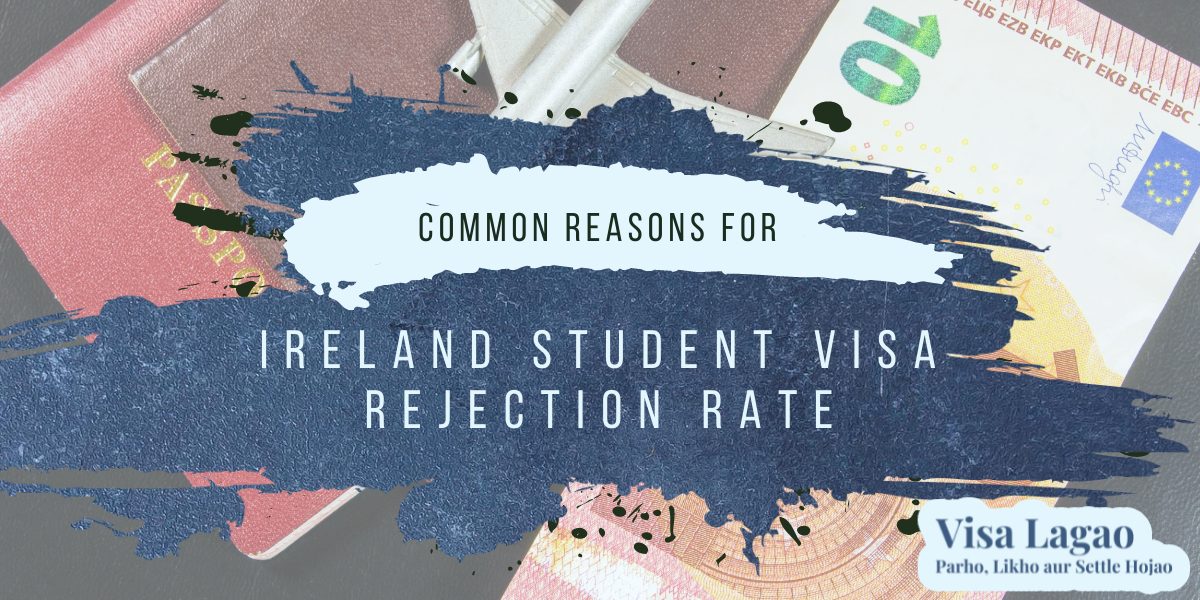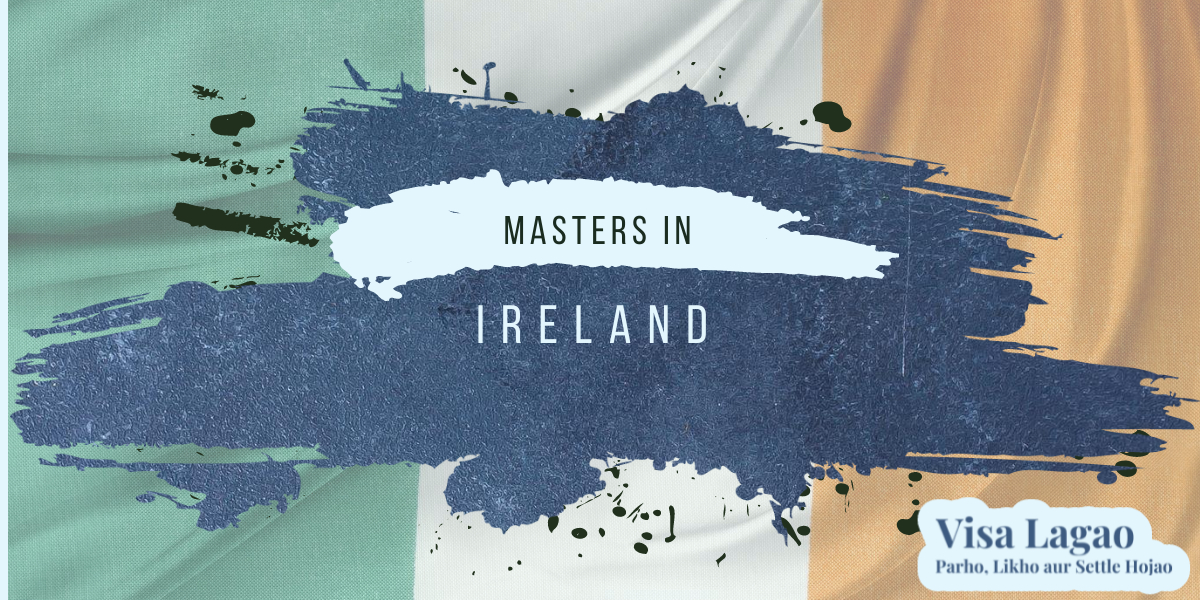Embarking on an educational journey in Ireland is an exciting opportunity for Pakistani students. However, understanding the intricacies of the student visa process is crucial to ensure a smooth transition. This guide provides comprehensive insights tailored for Pakistani applicants, highlighting visa rejection reasons, common pitfalls, and strategies to enhance approval chances.
For official guidelines, refer to the Irish Immigration Service, which provides detailed requirements and application procedures.
What You Need to Get Your Ireland Student Visa Approved
Ireland offers two primary student visa categories:
- Short Stay ‘C’ Study Visa: Designed for courses lasting less than three months.
- Long Stay ‘D’ Study Visa: Intended for courses exceeding three months in duration.
Key Eligibility Requirements
The student visa success rate for Pakistani applicants to Ireland is approximately 96%, with only 1–4% facing rejection. Approval depends on proper documentation, financial proof, and academic background. Ensuring complete and accurate paperwork increases the chances of securing a visa successfully.
To qualify for an Ireland student visa, applicants must:
- Proof of Enrollment: Secure an acceptance letter from a recognized Irish educational institution. More details on choosing the right institution can be found on Education in Ireland.
- Financial Evidence: Demonstrate sufficient funds to cover tuition fees and living expenses. As per the Irish Naturalisation and Immigration Service, visa-required nationals must show access to at least €10,000 for a year long study program.
- How to Show Proof of Funds:
- Personal bank statements for the last six months.
- Sponsor’s bank statements (if applicable) along with a sponsorship letter.
- Evidence of scholarship or financial aid (if any).
- Bank balance should remain stable and not have sudden large deposits.
- English Proficiency: Provide valid scores from recognized English language tests, such as IELTS or TOEFL.
- Health Insurance: Obtain valid medical insurance for the duration of the stay. The Irish Council for International Students provides guidance on student rights and insurance policies.
- Intent to Return: Convincingly demonstrate plans to return to Pakistan post-study.
Top Reasons for Ireland Student Visa Rejections & How to Fix Them

The Ireland student visa rejection rate ranges from 1% to 4%. Common reasons for rejection include financial instability, incomplete documentation, low English proficiency, and lack of intent to return. Understanding these factors and submitting a well-prepared application can improve approval chances.
- Financial Instability: Inadequate proof of funds can lead to rejection. Applicants must provide clear evidence of financial capability to support their stay.
- Incomplete Documentation: Missing or incorrect documents, such as untranslated certificates or unsigned application forms, can result in denial.
- Previous Immigration Violations: Past breaches of immigration laws can adversely affect the application.
- Criminal Records: A history of criminal activity is a significant red flag for visa officers.
- Lack of Academic Intent: Failing to justify the choice of course or institution may raise doubts about the applicant’s genuine educational intentions.
- Low English Proficiency: Inability to meet the required English language standards can hinder approval.
- Selecting the Wrong Visa Type: Applying for a C-Type Visa instead of a D-Type Visa for long-term study can lead to rejection.
- Medical Issues: Failure to meet Ireland’s health requirements or provide proper medical documentation may result in denial.
- Lack of Intention to Return: Visa officers must be convinced that the student intends to return to Pakistan after completing their studies.
- Academic Performance: A weak academic background or unexplained gaps in education can negatively impact approval chances.
- Incorrect or Misleading Information: Any discrepancies or inconsistencies in the application can cause rejection.
✅ Real-World Example: A Pakistani student applying for a master’s degree was rejected because their bank statement showed a large one-time deposit right before the application. This raised concerns about the stability of their finances. To avoid this, ensure that funds are maintained consistently for several months before applying.
Common Rejection Codes and Their Meanings
Visa refusal letters often contain specific codes indicating the reason for denial:
| Code | Meaning |
|---|---|
| ID (Insufficient Documentation) | Incomplete or improperly presented documents. |
| F (Finances) | Inadequate financial evidence to support the stay. |
| PF or PR (Public Funds or Public Resources) | Indication that the applicant may rely on public funds. |
| R (Reference in Ireland) | Lack of a valid reference or acceptance letter from an Irish institution. |
| P (Passport) | Issues related to the passport, such as imminent expiration. |
| VR or PVR (Visa Refused and Previous Visa Refusal(s)) | Prior visa refusals without rectification of underlying issues. |
| INCO (Inconsistencies) | Discrepancies in the application details. |
| SP (Student Profile) | Concerns regarding educational background or unexplained gaps. |
| CP (Course Profile) | Failure to justify the relevance of the chosen course. |
| OB (Obligation) | Inability to demonstrate a clear commitment to leaving Ireland after studies. |
| OC (Observe the Conditions) | Doubts about the applicant’s willingness to adhere to visa conditions. |
The Application Process for Ireland Student Visas
A structured approach can enhance the likelihood of approval.
Required Documents (Checklist Format):
✅ Completed visa application form
✅ Recent passport-sized photographs
✅ Valid passport
✅ Acceptance letter from an Irish educational institution
✅ Proof of payment of tuition fees
✅ Evidence of sufficient funds
✅ English language proficiency test results
✅ Medical insurance documentation
✅ Previous educational certificates and transcripts
✅ Statement of purpose outlining study plans and post-study intentions
Submission Process:
- Apply online through the Irish Immigration website.
- Schedule an appointment at the nearest VFS Global centre.
- Submit biometric data and required documents.
- The total appointment fee for each applicant, is 125 Euros. This includes a 60 Euro visa fee and a 65 Euro appointment fee, payable together.
Estimated Visa Processing Times for Pakistani Applicants
- Standard Processing Time: 4–8 weeks
- Peak Season (July–September): May take up to 10 weeks
- Recommended Timeline: Apply at least 3–6 months before the course start date
Post-Rejection Procedures
If your visa gets rejected, don’t lose hope. You can either reapply or appeal the decision.
How to Reapply After a Refusal
- Address the issues stated in the rejection letter.
- Submit stronger evidence of financial stability.
- Ensure complete and accurate documentation.
- Improve English proficiency if needed.
Appeals Process
- File an appeal within two months of rejection.
- Write a detailed letter addressing the refusal reasons.
- Submit additional supporting documents.
- Wait for reconsideration (typically takes 4–6 weeks).
Frequently Asked Questions (FAQs)
✅ Can family members accompany the student on a dependent visa?
Yes, but strict conditions apply. Spouses and children may need to apply for a separate visa.
✅ Are students allowed to work while studying?
Yes, students on a Stamp 2 visa can work up to 20 hours per week during term time and 40 hours during holidays.
✅ What happens if my visa expires before my course ends?
You must apply for an extension well before expiry to avoid legal issues.
By following these guidelines, Pakistani students can significantly improve their chances of obtaining an Ireland student visa and successfully pursuing their studies abroad.



